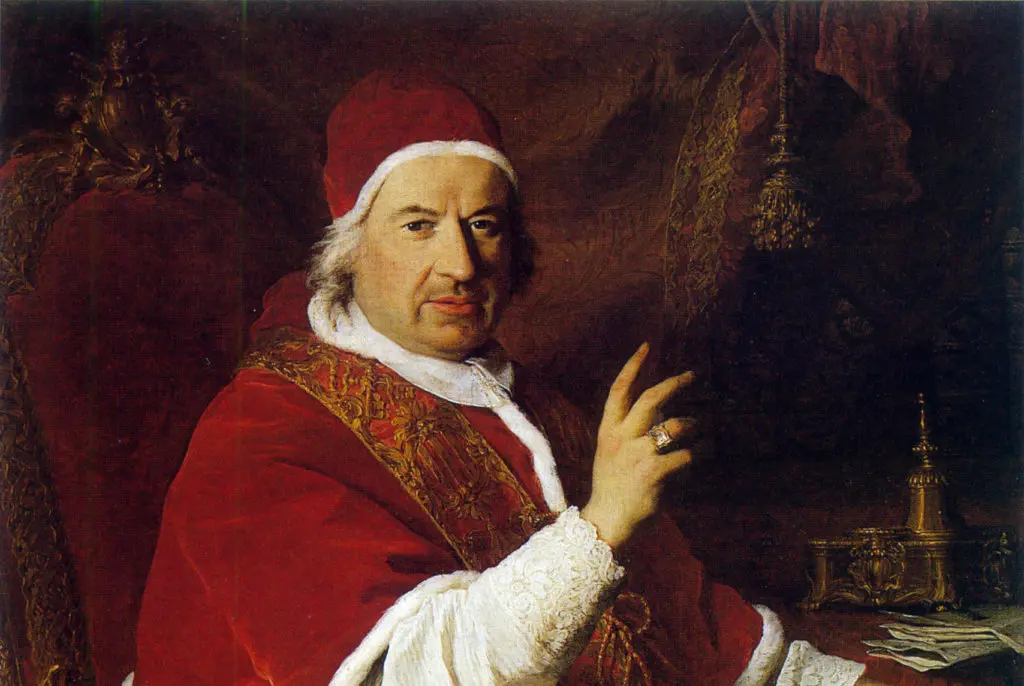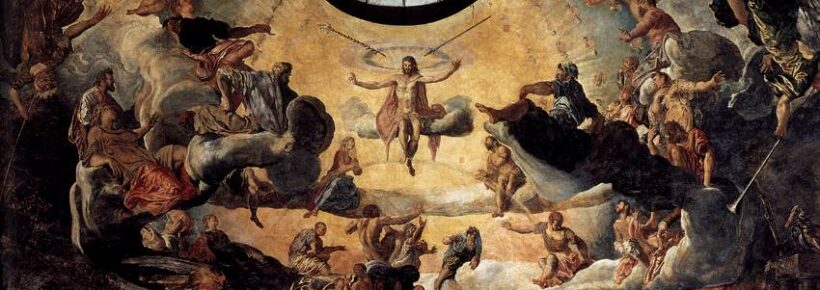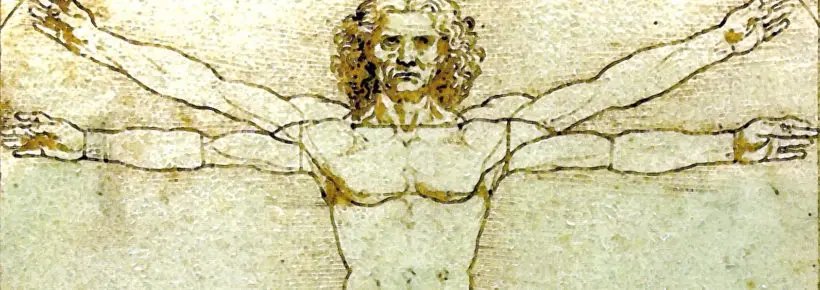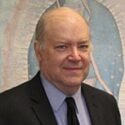What Does “Infallible” Mean?
There are two primary means by which the Church may declare a teaching infallible:
- The first and most definitive statement of infallibility is the Pope’s solemn declaration ex cathedra that a matter of faith or morals must be assented to in order for a Catholic to attain salvation. One example of such a pronouncement is the 1854 Apostolic Constitution of Pope Pius IX entitled Ineffabilis Deus (“The Immaculate Conception”).1
- The second means by which a Church teaching becomes infallible is through the ordinary magisterium. This is the usual day-to-day expression of the Church’s teaching authority, and does not require a solemn declaration by the Pope or by the assembled Bishops.2 The Canon of St. Vincent of Lorenz declares that any doctrine that has been taught “semper ubique ab omnibus”―always, everywhere, and by everyone―makes it part of the ordinary and universal Magisterial teaching.3
Contrary to popular (media) belief, Catholics are not just obligated to believe and obey the Pope when he speaks formally and infallibly. Lumen Gentium addressed the degree of assent that Catholics must give to all of the teachings of the Pope:
Loyal submission of the will and intellect must be given, in a special way, to the authentic teaching authority of the Roman Pontiff, even when he does not speak ex cathedra in such wise, indeed, that his supreme teaching authority be acknowledged with respect, and sincere assent be given to decisions made by him [¶25].
Is Church Teaching on Contraception Infallible?
Ancient and modern Catholic bishops and theologians have consistently condemned the practice of contraception since the founding of the Church. Since the reign of Pope Pius IX, when the question of contraception was first raised in modern times, more than thirty Church documents have stated that Catholics must not use it.4
Therefore, Church teaching on contraception has indeed been prohibited “semper ubique ab omnibus” and is to be obeyed.
The Second Vatican Council’s Dogmatic Constitution Lumen Gentium states:
Although the bishops, taken individually, do not enjoy the privilege of infallibility, they do, however, proclaim infallibly the doctrine of Christ on the following conditions: Namely, when, even though dispersed throughout the world but preserving for all that amongst themselves and with Peter’s successor the bond of communion, in their authoritative teaching concerning matters of faith and morals, they are in agreement that a particular teaching is to be held definitively and absolutely [¶25].
Again, every Catholic must assent by faith to an infallibly proclaimed doctrine resulting from either (1) an ex cathedra declaration or (2) the exercise of the ordinary magisterium, when the Church teaches one thing always and everywhere.
Disagreement with Church Teaching
Many disagree with the Church’s view on contraception. For example, a columnist for Catholics for [a Free] Choice, or CFFC, dreamily writes that “Humanae Vitae becomes the point at which many Catholics begin to decide to go their own way on issues of reproductive morality and yet remain Catholic in their minds and hearts.”5 This is complete fiction by a writer who seeks to substitute her emotions and untutored opinions for the truth.
If this sounds harsh, consider this: Anyone who claims to be a member of an organization, yet ignores and condemns the same group’s teachings, does not have a right to call himself one of its members. If he joins the army and refuses to bear arms or wear the uniform and, in fact, aids and abets the enemy, he is not a soldier, he is a traitor. The same principle applies to any other organization ― including the Catholic Church.
Yet the Church has been pressured to change her teaching:
Pope Paul VI’s 1968 encyclical Humanae Vitae is the primary focus of dissent on the issue of contraception. Anti-Catholic Rosemary Radford Ruether completely inverted reality when she called it one of the “greatest moral disasters of the Roman Catholic Church.”6 And the former president of the largest chain of abortion mills in the world, Pamela Maraldo (who refers to herself as a “devout Catholic”), has called the encyclical “pernicious” and an “embarrassing teaching.”17
But these wanna-be theologians are ignorant of a fundamental fact. Humanae Vitae did not create some new doctrine or dogma. It simply repeated and emphasized the infallible doctrine, already more than nineteen centuries old, that interference with the generation of human life is always gravely disordered and is thus proscribed.
Because of her constant and unwavering condemnation of birth control, always, everywhere, and by all of the bishops (except for a handful of recent Modernist dissenters), we may state without fear of authoritative contradiction that the Catholic Church’s ban on contraception is, indeed, an infallible doctrine.
Why Doesn’t the Pope Formally Declare Pro-Life Teachings Infallible?
For decades, a not inconsiderable number of pro-lifers have asked why the Pope does not just formally declare the Church’s teachings on abortion and contraception infallible. But leading pro-life theologians, including Monsignor William Smith, have debated the wisdom of this action, and have decided that it would cause more trouble that it would avoid in the long run.8

Besides, even if the Pope did declare the Church’s teachings on birth control and abortion infallible, there would be little change in the landscape of the debate. True Catholics, who understand the natural law and its implications, do not need such a formal declaration to live their lives in the manner Jesus Christ desires. And, of course, dissenters and those using contraception would simply deny the validity of such a pronouncement. As Ruether observes, “An effort to declare the ban on contraception “infallible” would have the immediate effect of focusing Catholic dissent on the doctrine of infallibility itself…. A storm of dissent, and even ridicule, directed at infallibility itself would ensue from such a declaration.”9
In 1988, Saint John Paul stated authoritatively that Humanae Vitae must be assented to by the faithful.10 CFFC immediately accused the Pope of “abusing the Magisterium.” One of its writers displayed a profound ignorance of the nature of Church teaching authority when she said, “In theological terms, they [the dissenters] see this as blurring the distinction between the changeable positions of the ordinary magisterium and the unchangeable truths of the extraordinary magisterium.”11
Shortly thereafter, 163 dissenting theologians signed a statement entitled “Against Incapacitation―for an Open Catholicism,” popularly known as the Cologne Declaration. CFFC published this Declaration in its newsletter Conscience: “We observe an attempt, theologically highly questionable, to enforce and overstep in an inadmissible way the Pope’s competence in the field of doctrinal teaching alongside that of jurisdiction.”12
The dissenter’s statements show that, even if the Holy Father infallibly declared contraception to be prohibited, they would simply ignore him. This is evident also from the fact that dissenters have even dismissed the infallible declaration by Pope Pius IX of the perpetual virginity of the Blessed Virgin Mary. To quote Rosemary Radford Ruether once again, “The methods of history, used in an unbiased manner, would almost certainly conclude that Jesus had normal siblings.”13
Dissenters have no problem with simply denying Our Lady’s perpetual virginity if it advances the cause of “reproductive rights,” which includes the “right” to birth control. These people perceive anti-woman conspiracies behind every Church declaration, and ascribe the most absurd motives to Church leaders who are trying to focus on purely theological matters.14 In fact, some of them even declare that the Church cannot speak infallibly under any form. As one example, dissenter Daniel C. Maguire says, “Making infallible statements through the medium of fallible language is a naive dream.”15
Therefore, any statement that “the Church’s teachings against contraception are not infallible” is simply a diversion, since the dissenters would attack any teaching against contraception that was solemnly declared infallible.
Conclusion

Recommended Reading:
Canadian Catholic Conference. “Statement on the Formation of Conscience,” December 1, 1973, at https://www.consciencelaws.org/religion/religion040.aspx.
+ Endnotes
[1] Pope Pius IX, Apostolic Constitution Ineffabilis Deus (“The Immaculate Conception”), December 8, 1854 (see also The Catechism of the Catholic Church, ¶496-507), and Pope Pius XII, Apostolic Constitution Munificentissimus Deus (“Defining the Dogma of the Assumption”), November 1, 1950. The Holy See has not provided a complete list of infallible papal or conciliar statements. Under Prefect Joseph Cardinal Ratzinger, the Congregation for the Doctrine of the Faith published its “Doctrinal Commentary on the Concluding Formula of the Professio Fidei” in 1998, which listed several of the infallible pronouncements made by popes and by ecumenical councils. It states, however, that this is not a complete list [¶11].
The dogma of papal infallibility was first ecumenically confirmed by Vatican I in 1869-1870. The Dogmatic Constitution on the Church Pastor Aeternus of the First Vatican Council declared: “We teach and define as a divinely revealed dogma that when the Roman Pontiff speaks EX CATHEDRA, that is, when, in the exercise of his office as shepherd and teacher of all Christians, in virtue of his supreme apostolic authority, he defines a doctrine concerning faith or morals to be held by the whole Church, he possesses, by the divine assistance promised to him in blessed Peter, that infallibility which the divine Redeemer willed his Church to enjoy in defining doctrine concerning faith or morals. Therefore, such definitions of the Roman Pontiff are of themselves, and not by the consent of the Church, irreformable. So then, should anyone, which God forbid, have the temerity to reject this definition of ours: let him be anathema” [¶9].
[2] Curiously, even Catholics for [a Free] Choice recognizes this principle, stating that “”Humanae Vitae belongs not to the infallible but to the ordinary magisterium” [Alberto Munera, S.J. “Catalyst for Moral Thinking.” Conscience, Winter 1993/1994, page 38]. This article is part of the commentary “Tarnished Silver Anniversary: Reflections on Humanae Vitae.”
[3] Monsignor William Smith, “Humanae Vitae, Dissent, and Infallibility.” Presentation at Human Life International’s “Conference on Love, Life, and the Family,” held in Santa Barbara, California in March of 1991.
[4] Karol Cardinal Wojtyla, et. al. “The Foundation of the Church’s Doctrine Concerning the Principles of Conjugal Life,” 1966, quoted in Charles W. Norris. “Why NFP?” Linacre Quarterly [Volume 80, Number 3], pages 218 to 221.
[5] Megan Hartman. “Humanae Vitae: Thirty Years of Discord and Dissent.” Conscience, Autumn 1998, pages 8 to 16.
[6] Rosemary Radford Ruether. “Watershed for Faithful Catholics.” Conscience, Winter 1993/1994, pages 31 and 32. This article is part of the commentary “Tarnished Silver Anniversary: Reflections on Humanae Vitae.”
[7] Pamela J. Maraldo, former President of the Planned Parenthood Federation of America (PPFA). “Misogyny that Will Pass.” Conscience, Winter 1993/1994, page 38. This article is part of the commentary “Tarnished Silver Anniversary: Reflections on Humanae Vitae.”
[8] Monsignor William Smith, “Humanae Vitae, Dissent, and Infallibility.” Presentation at Human Life International’s “Conference on Love, Life, and the Family,” held in Santa Barbara, California in March of 1991.
[9] Rosemary Radford Ruether. “Catholics and Abortion: Authority vs. Dissent.” Conscience, November/December 1985, pages 9 to 11.
[10] Pope John Paul II convened a November 1988 conference under the auspices of the John Paul II Institute for Studies on Marriage and the Family entitled “Humanae Vitae: Twenty Years Later,” and, with Monsignor Carlo Caffarra, stated that Humanae Vitae must be assented to by the faithful.
[11] “Against Incapacitation―for an Open Catholicism” [the Cologne Declaration], published in Conscience, March/April 1989, pages 5 to 7.
[12] “Against Incapacitation―for an Open Catholicism” [the Cologne Declaration], published in Conscience, March/April 1989, pages 5 to 7.
[13] Maurice Hamington. “Like a Virgin… The Sexual Paradox of Mary.” Conscience, Spring 1998, pages 15 to 19.
[14] For example, Catholics for [a Free] Choice has claimed, “Because of her perpetual virginity, Mary has become the standard bearer for conservative and static notions of gender relations, reproductive rights, and, of course, sexuality…. By celebrating Mary’s lack of sexuality, the church denigrates the sexual…. Mary’s sexuality is largely a church construction. Any belief that human beings construct, we can deconstruct and rebuild. This reconstruction is taking place all the time in the lives of women who look to Mary for spiritual strength” [Maurice Hamington. “Like a Virgin… The Sexual Paradox of Mary.” Conscience, Spring 1998, pages 15 to 19].
[15] Daniel C. Maguire. “The Splendor of Control: A Commentary on Veritatis Splendor and the Elephant in the Living Room.” Conscience, Winter 1993/1994, pages 26 to 29.
Related Content
Dr. Brian Clowes has been HLI’s director of research since 1995 and is one of the most accomplished and respected intellectuals in the international pro-life movement. Best known as author of the most exhaustive pro-life informational resource volume The Facts of Life, and for his Pro-Life Basic Training Course, Brian is the author of nine books and over 500 scholarly and popular articles, and has traveled to 70 countries on six continents as a pro-life speaker, educator and trainer.












